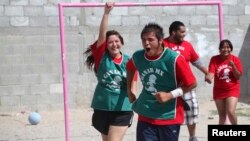The story of how soccer changed the course of one young man’s life and many others has heartened Washington diplomats, demonstrating how sports values can go beyond the scoreboard to bring social change.
The 2014 World Cup just ended with Germany claiming its fourth title. But embassies in Washington are using the tournament’s immense popularity to boost a program whose goal is to redirect high-risk Latin American youths to productive lives through soccer.
The “Soccer Saved My Life” campaign is aimed at showing how the principles of the sport known as " the beautiful game" can teach young women and men discipline and teamwork. More than 13,000 youths have participated in the program, which gradually takes them from the field to the classroom to the job site.
“We’ve taken a lot of kids off the streets and out of gangs, or they’ve stopped using drugs through this program,” said Michelle Nicholson, communications director for its parent organization, Partners of the Americas.
The program is called A Ganar which means "to win" or "to earn" in Spanish. It operates in 18 countries and is now making a new push to expand its Washington embassy support for the program.
A success story from Honduras
Tania Casco normally deals with bureaucratic matters as a First Secretary at the Embassy of Honduras in Washington. She said her “heart flooded when I heard the words” of the newfound success of a young man from her country, Guido Rivera, whom she met a recent fundraiser for the program.
Rivera was in Washington, speaking English confidently to a crowd, despite a lack of formal education.
“He said, ‘I dropped out of school and I had two options: join a drug cartel gang, or go and steal. Now, he’s on a better path,” Casco said. “It was amazing.”
Rivera now has more than a dozen young people under his tutelage, according to Casco. He thinks several of them can become leaders.
“Guido, he’s the perfect experience in saying, hey, his life has changed completely,” Casco said.
Without the program, “those kids are not involved in school or are doing anything,” she added.
“They have two roads to go through. And you know, we have a lot of criminal gangs,” she said. “This program creates leadership…In Honduras, sports is something that unifies all the Honduran community.”
The Honduran embassy held an event to benefit the Soccer Changed My Life campaign featuring the Honduran national team when it was in Washington for a pre-World Cup exhibition games. Some of the players spoke about how soccer was their escape from what would have been a life of criminal violence.
The program’s founding is attributed to an outgrowth of an idea by Brazilian and worldwide soccer legend Pele, who first raised it to the Inter-American Development bank. The Brazilian embassy in Washington maintains contact with the soccer program, which noted it has recruits playing virtually in the shadows of a World Cup stadium in Brazil.
A personal connection
The Mexican embassy is also close to the program. Like Honduras, Mexico sent over embassy staff members last week’s fundraiser at a downtown Washington restaurant.
But for Vanessa Calva, deputy press secretary for the embassy, the connection was personal as well as professional. The Mexican diplomat played soccer in high school – and still plays recreationally in the American capital.
“The discipline, commitment, teamwork, training and fun makes me appreciate a program like that more,” noted Calva.
“Sports had a huge impact on me,” she noted. “Feeling that you’re playing for something 'bigger' than you - your team, your school or your country - and yet you have a great sense of belonging as well,” can make a real difference, she said.
With the life-changing soccer program, Mexico’s Calva cited “positive results in our youth workforce development and skills that will enable them to seek out job opportunities that better their lives.”
The embassy is talking about “possibly how can we expand our collaboration with Partners. The love of soccer and our youth brought us together.”
Creating hope
Partners of the Americas president Stephen Vetter cites the respect the organization’s work earns in dangerous places like Mexico’s Ciudad Juarez, which has suffered greatly from drug trade violence.
“This is a war zone,” Vetter said. “The fact that soccer is the medium by which you are working in this very dangerous [area] and no one’s been injured or killed or kidnapped or ransomed, is really quite remarkable.”
Soccer can create hope in dangerous or impoverished places where youths “really haven’t had access to anyone who’s who willing to understand or support them,” Vetter said. Yet, it is also a rallying point in diplomatic Washington.
“It’s absolutely a bonding thing with the embassies,” he observed. “You can go in and start talking about soccer with anyone in the Latin American diplomatic corps. It helps establish your credentials.”
In fact, with several women staffers who have played top-level American college soccer, Partners plans to give its Soccer Saved My Life briefings to diplomats not only in the office, but on the field.
“Our staff now has organized a soccer team, so we can start playing the embassies,” Vetter said. “We hope that people will, after the World Cup, continue to value and appreciate the power that soccer has in our lives.”
Honduran diplomat Casco has seen firsthand how the soccer program provides the necessary tools to create young leaders.
“When you’re involved in a sport, you’re working on a team. What is your focus?” she asked. “You have to keep the ball in front, towards the goal.”










